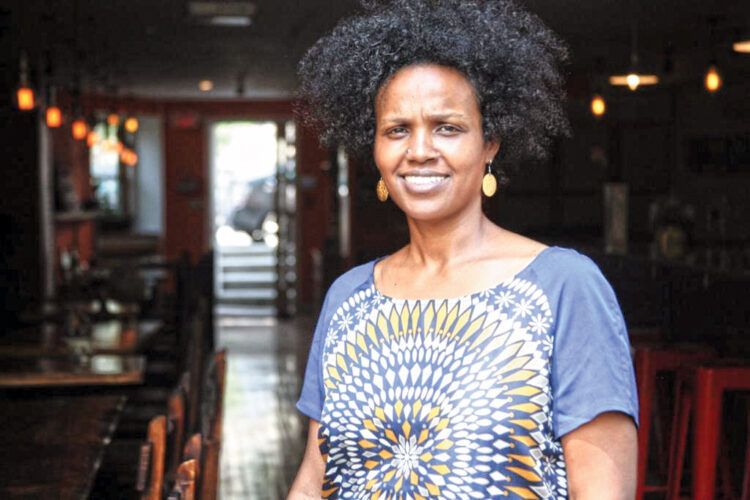This Harlem restaurant showcases Ethiopian-Israeli food at its best

By Rachel Ringler, The Nosher
Jimmy’s Chicken Shack was a food and jazz hub on St. Nicholas Avenue in Harlem in the 1940s. Malcolm X worked there. Jazz saxophonist Charlie Parker Jr. washed dishes there. At that same address you can still find food and jazz; but the name and the menu have changed.
It’s now called Tsion Café, and it was founded in 2014 by Beejhy Barhany, an Ethiopian Jewish Israeli woman who moved to Harlem from Israel. Her restaurant honors its past roots while highlighting the cultural and culinary mix of its present owner.
“As a Black person coming to Harlem,” she said, “I wanted to contribute something by showcasing my culture and honoring the legacy of the community. I wanted to open something that will add to the life of the residents of Harlem.”
Barhany describes herself as a wandering Jew. When she decided to make New York her home, she had already seen more of the world than many of us. Barhany was born in Tigray, which is in northern Ethiopia. In 1980, when she was 4 years old, her parents decided to satisfy their love and longing for Zion and move to Israel.
“We sacrificed so much to make aliyah to Israel,” says Barhany, “because we strongly believed that it is time to be in Jerusalem and in Israel, the Promised Land.” Her parents left Ethiopia with her, her younger sister, and a baby brother, 1 month old at that time.
 After three years of traveling across Ethiopia to Sudan, Uganda, Kenya, and France, Barhany and family arrived in Israel in 1983. Once there, the family moved from Pardes Hana, near Hadera in northern Israel, to Ashkelon in the south.
After three years of traveling across Ethiopia to Sudan, Uganda, Kenya, and France, Barhany and family arrived in Israel in 1983. Once there, the family moved from Pardes Hana, near Hadera in northern Israel, to Ashkelon in the south.
When she entered high school, Barhany elected to move to Kibbutz Alumim, a traditional kibbutz with many members from the United Kingdom and Argentina. She lived, worked, and studied there. She farmed the land, “pulling carrots, milking cows,” she said. And she felt her love for the land of Israel.
Following her three years in the Israel Defense Forces, Barhany did what many post-military service Israelis do: She hit the road to see the world. Her first stop was Manhattan, and she liked what she saw. She continued on to South America, but New York pulled her back. She was drawn to its diversity.
And you can see Barhany’s passion for diverse culinary traditions on her menu at Tsion Café. You’ll find the Ethiopian flatbread, injera, made with the gluten-free grain teff. She serves it with different Ethiopian dishes, like messer wot, a spiced red lentil stew. But to reflect the diversity in the Jewish world and in New York City, you can also have it with lox, eggs, and caramelized onions or with the North African shakshuka.
But this isn’t just any shakshuka: She flavors hers with berbere, a spice blend that is ubiquitous in Ethiopian cuisine. You will find the Yemenite flatbread, malawach, on the menu, too. Hers comes with honey and coconut flakes.
She was born in Ethiopia and that country and Africa will always be with her. But Israel is also very much a part of her, and the restaurant’s menu.
“I am Israeli, and Tel Aviv is part of me,” Barhany said. “I have to showcase that as well.” Much of the food on the menu is gluten-free and vegan. Her most popular dish is a combination of five various Ethiopian vegetarian stews, served on injera. Her food, she says, “nourishes the body and the soul.”
Because of the Covid-19 lockdown, her art-filled restaurant is closed now. They are only doing take-out and delivery.
The nights of jazz and poetry readings and folk music are on hold, too. She is busy keeping the restaurant going, but she has also been involved in demonstrations following the death of George Floyd, a Black man who was killed by police in Minnesota.
“There is systematic oppression and discrimination going on here,” said Barhany. “It’s about time that it be brought to light and that people are made aware. We need a change in the way institutions treat people of color.”
Barhany is no stranger to standing up for what she believes in. Not long after she arrived in New York, she founded the non-profit organization Beta Israel North America. BINA was created to foster the continuity of the Ethiopian Jewish (Beta Israel) cultural heritage and promote understanding of its traditions and history among Jews and non-Jews.
“Food is a great denominator to bring understanding,” said Barhany. “People are pleasantly surprised and happy to engage and learn about Israeli food. Here and there is antagonism. But overall the reaction is very positive. And in Harlem, people like the name Tsion.”
Ethiopian Spiced Red Lentils (Messer Wot) by Beejhy Barhany, Tsion Café
2 cups red Lentils
2 red onions
2 white onions
6 cloves of garlic
2 tsp. fresh ginger
1 cup oil
2 Tbsp. berbere spice (see below)
1 tsp. salt
1 6-oz can tomato paste
4 cups water
For the berbere spice mix:
1 cup chili powder or hot paprika
½ Tbsp. dried clove
1 Tbsp. ground cardamom
1 Tbsp. ground ginger
1 Tbsp. onion powder
1 Tbsp. ground coriander
1 Tbsp. cumin
½ Tbsp. cinnamon
½ Tbsp. nutmeg
½ Tbsp. ground fenugreek seed
1 Tbsp. pepper
1 Tbsp. salt
To make the berbere spice, sift and mix together all ingredients.
Purée onions, garlic, ginger in food processor.
In a large pan, sauté your onion, garlic, ginger in oil. Cook until softened, for 10 to 15 minutes, stirring occasionally.
Add tomato paste, half cup water, berbere spice, and salt. Cook for 15 minutes while stirring, reduce heat.
Rinse lentils and add to pan; stir and bring to a boil; cover and simmer the lentils, stirring occasionally for 20 minutes until the lentils are soft. Add water as needed. Add salt to taste.
Serve with injera (Ethiopian flatbread) or rice.
To read the complete August 2020 Dayton Jewish Observer, click here.


